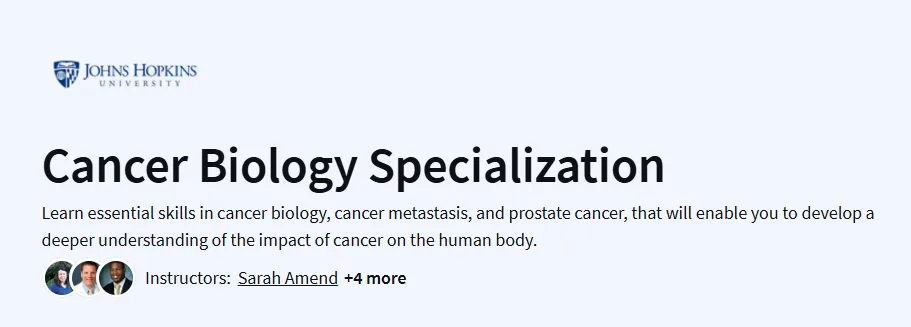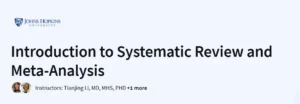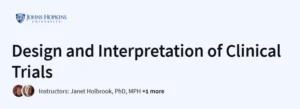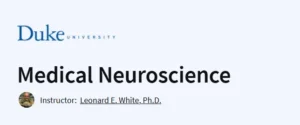What you will learn in Cancer Biology Specialization Course
- Master the 10 biological hallmarks of cancer
- Understand genetic mutations driving tumor development
- Analyze cancer genomics data using bioinformatics tools
- Evaluate modern diagnostic and treatment approaches
- Explore tumor microenvironment and immunotherapy
- Interpret cancer research literature critically
- Examine ethical issues in oncology research
Program Overview
Introduction to Cancer Biology
⏱️ 4 weeks
- Learn cancer epidemiology and global burden
- Study multistep carcinogenesis models
- Analyze cancer stem cell theory
- Explore case studies of common cancers
Molecular Basis of Cancer
⏱️4 weeks
- Examine oncogenes and tumor suppressor genes
- Investigate DNA repair mechanisms
- Study epigenetic modifications in cancer
- Practice using COSMIC mutation database
Cancer Diagnosis and Therapy
⏱️ 2 weeks
- Compare imaging modalities (CT/MRI/PET)
- Evaluate chemotherapy and radiation mechanisms
- Analyze emerging immunotherapies
- Participate in virtual tumor boards
Cancer Genomics
⏱️ 4 weeks
- Process next-generation sequencing data
- Identify actionable biomarkers
- Design targeted therapy plans
- Debate ethical dilemmas in precision oncology
Get certificate
Job Outlook
- Salary range: 85K−150K for cancer researchers (Glassdoor)
- Industry demand: 7% growth for medical scientists (BLS 2022-32)
- Top employers: Academic hospitals, biotech firms, pharma
- Career paths: Research Associate → Principal Investigator
- Certification value: Recognized by top cancer centers
Specification: Cancer Biology Specialization
|
FAQs
- You’ll start with “Introduction to the Biology of Cancer,” exploring fundamental concepts like cancer cell growth, epidemiology, and treatment planning. It includes modules on molecular biology, pathology, and medical imaging.
- Next comes “Understanding Cancer Metastasis,” focusing on how cancer spreads, the biology behind metastasis, clinical implications, and interventions.
- Finally, you’ll study “Understanding Prostate Cancer,” which covers risk factors, progression, diagnostic criteria, staging, and treatments specific to prostate cancer.
- Together, these three courses give you a comprehensive grasp of cancer development—from basic biology to advanced pathology.
- You’ll gain hard skills in areas like oncology, molecular biology, epidemiology, treatment planning, and precision medicine.
- The entire specialization spans 3 courses, designed to be completed in about 1 month at a pace of 10 hours per week.
- That translates to an estimated 40 hours total, though individual pacing may vary. The first course is around 8 hours, while later ones are longer (25–34 hours) based on their depth.
- It’s a self-paced, fully online program, letting you learn on your own schedule with flexibility.
- You’ll interact with a variety of materials—like lectures, readings, and quizzes—culminating in assessments and a shareable certificate upon successful completion.
- No—each course is marked beginner level, and none require prior expertise. No prerequisites are mentioned.
- The content begins with foundational cancer biology, making it accessible even if you’re new to the subject.
- That said, having basic knowledge in biology or anatomy could help you absorb advanced sections (e.g., metastasis or prostate cancer) more quickly.
- The courses are well-structured to guide you through complex topics in a digestible way—even for non-scientists.
- If you’ve ever wondered how cancer develops or how treatments work, you’ll find this a solid entry point.
- The specialization is offered by Johns Hopkins University, a globally respected institution in health and medical research.
- Instructors include Sarah Amend along with four other faculty members—all experts in oncology and molecular biology.
- Learner reviews are outstanding—rated approximately 4.9 out of 5 (based on over 2,000 reviews), reflecting high quality and relevance.
- Hundreds of learners are enrolled—demonstrating popularity and trust in the specialization.
- You’ll gain not just theory, but clinically relevant knowledge applicable to healthcare, research, and public health.
- Yes—the specialization offers a shareable certificate of completion that you can add to your LinkedIn profile, résumé, or CV.
- The certificate denotes formal recognition from Johns Hopkins University and carries academic and professional credibility.
- You can audit the courses for free, gaining access to materials—certificate access requires enrollment.
- Financial aid is available for eligible learners to cover certificate costs if needed.
- Earning this credential can boost your understanding and credentials in fields like oncology, molecular biology, healthcare policy, or even as a foundation for further studies.





